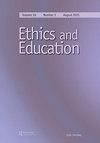Inflorescent dignity: a reconstructive interpretation of Martha Nussbaum’s conception of dignity and its implications for education
IF 0.7
Q3 EDUCATION & EDUCATIONAL RESEARCH
引用次数: 0
Abstract
ABSTRACT The concept of human dignity arguably has great relevance to education as it is mentioned in several human rights and education policy documents on the national and international level, providing their moral justification. However, when the concept is discussed within philosophical research, it is often seen as consisting of two different conceptions – intrinsic dignity and attributed dignity. The paper seeks to challenge this binary through a reconstructive interpretation of Martha Nussbaum’s conception of dignity, proposing inflorescent dignity, as a more fully fledged way of understanding dignity and how it relates to education. Through use of a fictional example, I argue that inflorescent dignity, grounded in intrinsic dignity, has relevance to education because it gives rise to moral, relational, and thus pedagogical, demands on education to be primarily focused on human flourishing as well as the acknowledgement of human actuality and potential, and for this to permeate all levels of education.花序尊严:玛莎·努斯鲍姆尊严概念的重构解释及其对教育的影响
正如国家和国际层面的几份人权和教育政策文件中提到的那样,人的尊严概念可以说与教育有着巨大的相关性,并为其提供了道德依据。然而,当在哲学研究中讨论这个概念时,人们通常认为它由两个不同的概念组成——内在尊严和归因尊严。本文试图通过对玛莎·努斯鲍姆的尊严观的重建性解释来挑战这种二元性,提出了一种更成熟的方式来理解尊严及其与教育的关系。通过使用一个虚构的例子,我认为,建立在内在尊严基础上的根深蒂固的尊严与教育有关,因为它产生了道德、关系和教育学,要求教育主要关注人类的繁荣以及对人类现实和潜力的承认,并渗透到各级教育中。
本文章由计算机程序翻译,如有差异,请以英文原文为准。
求助全文
约1分钟内获得全文
求助全文

 求助内容:
求助内容: 应助结果提醒方式:
应助结果提醒方式:


